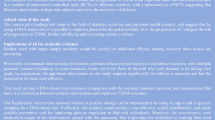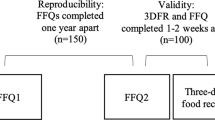Abstract
Objectives: Repeatability of a dietary method is important in determining the quality of nutritional data. It should be assessed in the population of interest. This study evaluated the repeatability of nutritional data from standardized three-day dietary records, from the clinic-based, cross-sectional multi-centre EURODIAB IDDM Complications Study.
Design and Subjects: 15% of the total EURODIAB cohort was randomly selected to test the repeatability of nutritional intake data. Two three-day records, completed three weeks apart, were available for 216 diabetic patients (7.5%) representative of the total cohort. All records were analysed centrally, for intakes of protein (animal and vegetable), fat (saturated fat and cholesterol), carbohydrate, fibre, alcohol and energy. Repeatability was measured comparing mean intakes, determining the proportion of patients classified into the same/opposite quartile by the two three-day records and assessing mean differences with standard deviations (s.d.d).
Results: There were no significant differences in mean energy and nutrient intakes between the first and second records. Classification of individuals into the opposite quartile occurred only in 0–4% of patients and overall about 50% (range 44–74%) of the subjects were classified into the same quartiles of intakes. Only small mean differences were found for energy intake (−156 (1633) kJ; 95% confidence limits −375, 63 kJ) and nutrients with s.d.ds comparable to intra-individual variations in the general population. The differences in energy intake were randomly distributed over the range of intakes.
Conclusions: The present study demonstrates that standardized three day dietary records show a high degree of repeatability within a short period of time in a sample of European IDDM patients. The good repeatability strengthens the conclusions drawn from the nutritional data in the EURODIAB IDDM Complications Study.
Sponsorship: Nutrition Co-ordinating Centre research funds, Diabetes Research Institute at Heinrich-Heine University, Düsseldorf. The EURODIAB IDDM Complications Study was supported by the European Community.
This is a preview of subscription content, access via your institution
Access options
Subscribe to this journal
Receive 12 print issues and online access
$259.00 per year
only $21.58 per issue
Buy this article
- Purchase on Springer Link
- Instant access to full article PDF
Prices may be subject to local taxes which are calculated during checkout
Similar content being viewed by others
Author information
Authors and Affiliations
Consortia
Rights and permissions
About this article
Cite this article
Toeller, M., Buyken, A., Heitkamp, G. et al. Repeatability of three-day dietary records in the EURODIAB IDDM Complications Study. Eur J Clin Nutr 51, 74–80 (1997). https://doi.org/10.1038/sj.ejcn.1600364
Received:
Revised:
Accepted:
Issue Date:
DOI: https://doi.org/10.1038/sj.ejcn.1600364
Keywords
This article is cited by
-
Time-restricted eating effects on performance, immune function, and body composition in elite cyclists: a randomized controlled trial
Journal of the International Society of Sports Nutrition (2020)
-
Effects of eight weeks of time-restricted feeding (16/8) on basal metabolism, maximal strength, body composition, inflammation, and cardiovascular risk factors in resistance-trained males
Journal of Translational Medicine (2016)
-
Association of diet and lifestyle with glycated haemoglobin in type 1 diabetes participants in the EURODIAB prospective complications study
European Journal of Clinical Nutrition (2016)
-
Dietary phosphorus intake and distribution in Chinese peritoneal dialysis patients with and without hyperphosphatemia
Clinical and Experimental Nephrology (2015)
-
Do European people with type 1 diabetes consume a high atherogenic diet? 7-year follow-up of the EURODIAB Prospective Complications Study
European Journal of Nutrition (2013)



